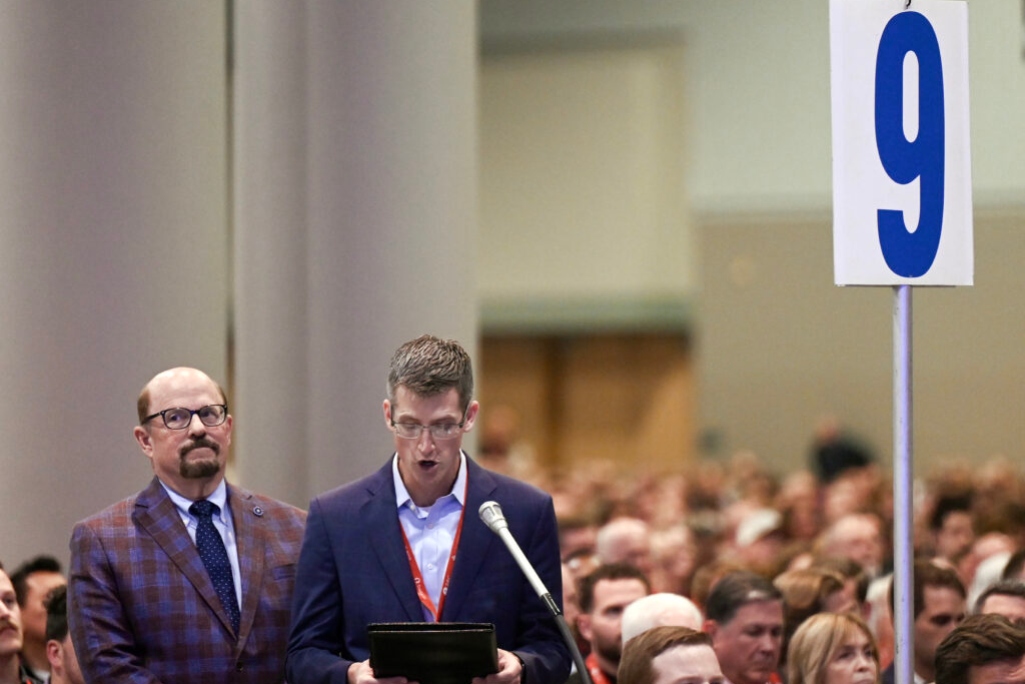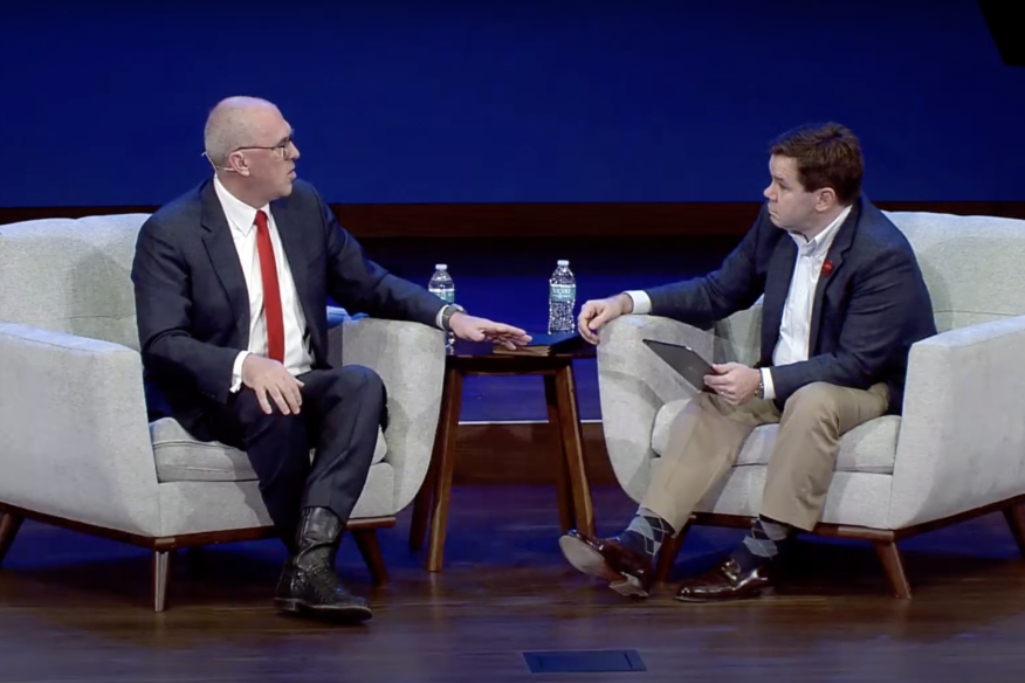
Photo Description Long lines quickly formed at each microphone on the floor of the convention center hall as pastors and other messengers prepared to present arguments for and against the motion calling on the BGCT to affirm the 2000 Baptist Faith and Message.
WACO, Texas (BP) — Messengers to Texas Baptists’ annual meeting soundly defeated a motion affirming the Baptist Faith and Message 2000, the Southern Baptist Convention (SBC) statement of faith that limits the role of pastor to men.
During the Nov. 12 business session, messengers debated a motion by Jeff Williams, pastor of First Baptist Church in Denton “that the Baptist General Convention of Texas (BGCT) affirm the 2000 Baptist Faith & Message.”
North American Mission Board (NAMB) President Kevin Ezell raised the issue of the Baptist Faith and Message in response to a question from a Texas Baptist pastor at the SBC annual meeting in June.
Ezell said NAMB will not fund church starts within Texas in partnership with uniquely BGCT-affiliated congregations and suggested Texas Baptists change their statement of faith. He said NAMB’s “longstanding commitment” is to start churches in partnership with state conventions that affirm the 2000 version of the Baptist Faith and Message.
“I cannot and will not change that standard,” Ezell said. “But I would love for you to consider and for your state convention to adopt the Baptist Faith and Message 2000.”
Williams was one of several Texas Baptist pastors involved in an Aug. 15 meeting in Dallas involving BGCT and NAMB representatives.
Speaking in favor of his motion from the floor of Texas Baptists’ annual meeting, Williams said his intention was not for the Baptist Faith and Message 2000 to replace the 1963 Baptist Faith and Message as the BGCT statement of faith, but that it would stand alongside it.
Williams pointed out statements in BGCT Executive Director Julio Guarneri’s report noting the rapid population growth in Texas.
“I think we’d all agree we need hundreds — if not thousands —of new churches here in Texas to reach those people with the gospel of Jesus Christ,” Williams said.
“I believe we need to give our churches every opportunity — every resource available — to help them to start those churches in the decades to come.”
Williams voiced his belief NAMB has done “a wonderful job in the last couple of decades in helping churches start churches, and I think we need to do all we can to help our churches work with NAMB to start those churches.”
Debate for and against the motion
Long lines quickly formed at each microphone on the floor of the convention center hall as pastors and other messengers prepared to present arguments for and against the motion.
Randel Everett, former BGCT executive director and messenger from First Baptist Church in Waco, noted he has spent the last 10 years with 21Wilberforce advocating for believers globally who are persecuted for their faith.
As his organization stood alongside persecuted people of faith, he noted, members of the persecuted church globally asked for prayer, but they never asked about a statement of faith.
“I pray that we’ll not be distracted by debate over a 25-year-old controversial statement of faith but that we’ll focus on what we’ve focused on here this week — the Great Commandment and the Great Commission,” Everett said.
Pete Pawelek, pastor of the Cowboy Fellowship of Atascosa County, spoke in favor of the motion, saying it honors the principle of local church autonomy by leaving the decision of a statement of faith up to individual congregations.
Currently, the BGCT includes churches that affirm the 1963 Baptist Faith and Message, the Baptist Faith and Message 2000 and the 19th century New Hampshire Confession of Faith, he noted.
“While our convention has affirmed these other confessions in various ways at various times in our history, we — to my knowledge — have never officially affirmed the 2000 BFM,” Pawelek said.
“Since we accept it in practice and allow our churches to adopt it, it only stands to reason that we would affirm it on this day and put on paper what we practice.”
He further asserted: “A ‘no’ vote on this motion will put our convention in a very challenging and precarious position. If we proclaim to the world that we do not affirm the BFM 2000, we risk distancing ourselves from many of our Texas Baptist churches that not only affirm it but that have adopted it as their confession.”
Brent Gentzel, pastor of First Baptist Church in Kaufman, spoke against the motion, saying his church encourages its members to exercise the kind of gifts named in Ephesians 4:11-12 for the building up of the church. For a quarter-century, he noted, his church has used the term “pastor” to refer to people who are doing the work of a pastor, without regard to gender.
“So you can imagine my surprise when three of the women of our church staff found their names and faces plastered on the SBC blacklist that was blasted out to tens of thousands of churches across America a year and a half ago,” Gentzel said.
The SBC has been “weaponizing” the Baptist Faith and Message 2000 to declare that no woman can pastor in any capacity in any church, he said.
Taylor Lassiter, pastor of College Heights Baptist Church in Plainview, spoke in favor of the motion on the grounds of “biblical clarity and gospel cooperation.” Affirmation of the Baptist Faith and Message 2000 would strengthen Texas Baptists’ clear commitment to Scripture and to partnerships that advance the spread of the gospel, he asserted.
“Let’s do what it will take to link arms with other Baptists committed to the Great Commission and the Great Commandment,” he said.
‘It wasn’t written for us’
David Lowrie, pastor of First Baptist Church in Decatur, spoke against the motion. While he identified himself as a Southern Baptist pastor, he noted a significant minority of churches affiliated with the BGCT are not related to the SBC.
“Many of our brothers and sisters cannot in good conscience affirm this Baptist Faith & Message,” Lowrie said. “It was written by Southern Baptists for Southern Baptists. It represents well many of the values of Southern Baptists, but it wasn’t written for us. It doesn’t represent us.”
Regarding the issue of cooperation, Lowrie noted, the BGCT forwards more money — about $72.8 million — to the SBC than does the Southern Baptists of Texas Convention. NAMB willingly cooperates with SBTC in church planting, but not with the BGCT.
“How do you define cooperation if $72.8 million does not represent a good faith commitment to the mission of the Southern Baptist Convention?” he asked. “Our Texas Baptist Southern Baptist churches are being treated as second-class citizens — even as stepchildren — and that is simply not appropriate.”
Daniel Perez, pastor of First Baptist Church in Los Fresnos, spoke in favor of the motion, saying churches that allow women to serve as pastors are departing from “God’s design.”
“You’re not helping the kingdom. You’re not breaking chains and setting women free to serve as pastors. You’re breaking God’s heart,” he said.
Failing to limit the pastorate to men is a “downward spiral” that leads to compromise with “clear” biblical principles in other areas, Perez insisted.
Ross Chandler, pastor of First Baptist Church in Marble Falls, spoke against the motion, saying Texas Baptists have “thoughtfully and prayerfully” not adopted the Baptist Faith and Message 2000 on biblical and theological grounds.
He noted the 2000 version of the statement of faith removed an important sentence that was part of the 1963 Baptist Faith and Message: “The criterion by which the Bible is to be interpreted is Jesus Christ.”
At the same time, the 2000 statement of faith added language limiting the pastorate to men as if biblical teaching about the role of women is beyond debate, he said.
“It’s not that clear,” he asserted, citing New Testament verses that could be used to support women in ministry, alongside others that are used to place limits on women.
“The SBC has gotten it wrong. The SBC and NAMB are hurting the kingdom of God,” Chandler said. “It’s not biblical or right to push that on us.”
BF&M 2000 ‘fundamentally different’
After a motion to stop debate failed, the chair recognized Matt Snowden, pastor of First Baptist Church in Waco, who spoke against the motion, saying it would “draw a circle” that would exclude many churches, as well as exclude institutions such as Baylor University’s Truett Theological Seminary.
“That represents a fundamental shift in our identity, our culture and our purpose,” Snowden said. “I ask you, I plead with you, don’t do something unnecessary and potentially devastating. It doesn’t make much sense.”
Jordan Velazco, pastor of Lone Oak Baptist Church, spoke in favor of the motion, insisting it would not infringe upon local church autonomy. He also said the Baptist Faith and Message 2000 affirms other important matters not dealt with in the 1963 statement of faith.
Bruce Webb, pastor of The Woodlands First Baptist Church, spoke against the motion, saying Texas Baptists have opposed the Baptist Faith and Message 2000 on the basis of their commitment to the authority and sufficiency of Scripture and the lordship of Jesus Christ.
Earlier confessions of faith made it clear they were simply expressions of commonly held beliefs, not a binding creedal statement, but the Baptist Faith & Message is 2000 “fundamentally different,” he asserted.
“I have PTSD from serving on a committee with God-fearing Southern Baptist missionaries who were fired 25 years ago because this document was used to fire them,” Webb said. “It was written by a group of partisan Baptists with the purpose to control and divide.”
Texas Baptists intentionally have rejected the Baptist Faith and Message 2000 for more than two decades, and they should continue to do so, Webb asserted.
They did, by a clear margin.
(EDITOR’S NOTE — Ken Camp is the managing editor of Baptist Standard. This article originally appeared in the Baptist Standard.)


